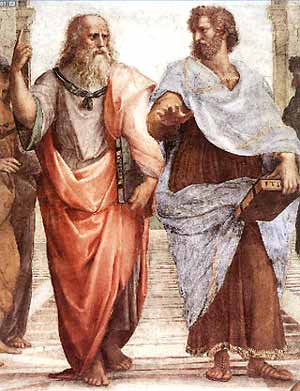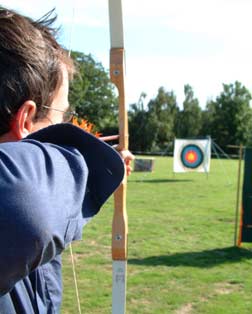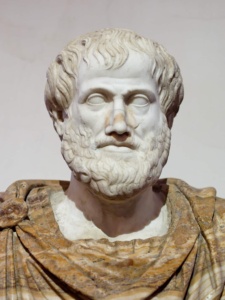what are the ingredients required for happiness according to aristotle (1.8)
Happiness is the meaning and purpose of life, the whole aim and cease of human existence.
Aristotle
Aristotle & Happiness
CONTENTS
- Aristotle'south Background
- Happiness as Ultimate Purpose
- Aristotle's Hierarchical View of Nature
- Aristotle's Definition of Happiness
- Happiness equally the Practise of Virtue
- Aristotle & Friendship
- The Golden Mean
- Bibliography
- Internet Resources
"Happiness depends on ourselves." More than everyone else, Aristotle enshrines happiness every bit a cardinal purpose of human life and a goal in itself. Equally a result he devotes more space to the topic of happiness than whatever thinker prior to the modern era.

Living during the same period every bit Mencius, only on the other side of the earth, he draws some like conclusions. That is, happiness depends on the tillage of virtue, though his virtues are somewhat more individualistic than the substantially social virtues of the Confucians.
All the same every bit nosotros shall meet, Aristotle was convinced that a genuinely happy life required the fulfillment of a broad range of conditions, including physical also as mental well-being. In this way he introduced the idea of a science of happiness in the classical sense, in terms of a new field of knowledge.
Essentially, Aristotle argues that virtue is achieved by maintaining the Hateful, which is the residuum betwixt two excesses. Aristotle's doctrine of the Mean is reminiscent of Buddha'southward Heart Path, just there are intriguing differences. For Aristotle the mean was a method of achieving virtue, just for Buddha the Centre Path referred to a peaceful way of life which negotiated the extremes of harsh asceticism and sensual pleasure seeking. The Middle Path was a minimal requirement for the meditative life, and not the source of virtue in itself.
Aristotle: A Niggling Background
Aristotle is one of the greatest thinkers in the history of western science and philosophy, making contributions to logic, metaphysics, mathematics, physics, biology, phytology, ethics, politics, agriculture, medicine, dance and theatre. He was a pupil of Plato who in turn studied under Socrates. Although nosotros practice not actually possess any of Aristotle's own writings intended for publication, we have volumes of the lecture notes he delivered for his students; through these Aristotle was to exercise his profound influence through the ages. Indeed, the medieval outlook is sometimes considered to exist the "Aristotelian worldview" and St. Thomas Aquinas simply refers to Aristotle as "The Philosopher" equally though in that location were no other.
Aristotle was the first to classify areas of human knowledge into distinct disciplines such every bit mathematics, biological science, and ethics. Some of these classifications are still used today, such as the species-genus organization taught in biological science classes. He was the first to devise a formal arrangement for reasoning, whereby the validity of an argument is determined by its construction rather than its content. Consider the following syllogism: All men are mortal; Socrates is a human; therefore, Socrates is mortal. Here nosotros can see that as long as the premises are true, the decision must too be true, no matter what we substitute for "men or "is mortal." Aristotle's brand of logic dominated this area of thought until the rise of modern symbolic logic in the belatedly 19th Century.
Aristotle was the founder of the Lyceum, the first scientific constitute, based in Athens, Greece. Along with his teacher Plato, he was one of the strongest advocates of a liberal arts didactics, which stresses the education of the whole person, including one's moral graphic symbol, rather than merely learning a set of skills. According to Aristotle, this view of education is necessary if we are to produce a order of happy likewise as productive individuals.

Happiness as the Ultimate
Purpose of Human being Beingness
One of Aristotle'due south well-nigh influential works is the Nicomachean Ethics, where he presents a theory of happiness that is still relevant today, over 2,300 years later. The key question Aristotle seeks to answer in these lectures is "What is the ultimate purpose of human existence?" What is that end or goal for which we should direct all of our activities? Everywhere we run into people seeking pleasure, wealth, and a expert reputation. But while each of these has some value, none of them tin occupy the place of the chief adept for which humanity should aim. To exist an ultimate cease, an act must exist self-sufficient and final, "that which is always desirable in itself and never for the sake of something else" (Nicomachean Ideals, 1097a30-34), and information technology must exist attainable by human being. Aristotle claims that nearly everyone would agree that happiness is the end which meets all these requirements. It is easy enough to run into that we want money, pleasance, and accolade simply because we believe that these goods will make us happy. It seems that all other goods are a means towards obtaining happiness, while happiness is always an finish in itself.
The Greek word that commonly gets translated equally "happiness" is eudaimonia, and like nearly translations from ancient languages, this can be misleading. The main trouble is that happiness (especially in modern America) is often conceived of as a subjective state of heed, as when one says ane is happy when 1 is enjoying a cool beer on a hot day, or is out "having fun" with 1's friends. For Aristotle, yet, happiness is a final end or goal that encompasses the totality of one's life. It is not something that tin be gained or lost in a few hours, like pleasurable sensations. It is more similar the ultimate value of your life every bit lived up to this moment, measuring how well you take lived upward to your full potential as a human being beingness. For this reason, one cannot really make any pronouncements about whether i has lived a happy life until it is over, just equally we would not say of a football game that information technology was a "great game" at halftime (indeed we know of many such games that turn out to exist blowouts or duds). For the aforementioned reason nosotros cannot say that children are happy, any more than than we tin say that an acorn is a tree, for the potential for a flourishing human life has non all the same been realized. As Aristotle says, "for every bit it is non one swallow or one fine twenty-four hour period that makes a spring, and so it is non one day or a brusk time that makes a human blessed and happy." (Nicomachean Ethics, 1098a18)
Aristotle Explains The Hierarchical View of Nature
| In club to explain human happiness, Aristotle draws on a view of nature he derived from his biological investigations. If we look at nature, we notice that there are four unlike kinds of things that exist in the earth, each one defined by a different purpose: |
| Mineral: rocks, metals and other lifeless things. The only goal which these things seek is to come to a residual. They are "beyond stupid" since they are inanimate objects with no soul |
| Vegetative: plants and other wild animals. Here nosotros see a new kind of thing sally,something which is alive. Considering plants seek nourishment and growth, they have souls and can be even said to exist satisfied when they attain these goals |
| Animal: all the creatures we report equally belonging to the animal kingdom. Here we see a college level of life emerge: animals seek pleasance and reproduction, and we can talk about a happy or pitiful dog, for example, to the extent that they are salubrious and pb a pleasant life |
| Human: what is it that makes human beings unlike from the rest of the animal kingdom? Aristotle answers: Reason. Simply humans are capable of acting according to principles, and in so doing taking responsibility for their choices. Nosotros can blame Johnny for stealing the candy since he knows it is wrong, but we wouldn't blame an animal since it doesn't know any better. |
| Information technology seems that our unique role is to reason: by reasoning things out we attain our ends, solve our bug, and hence live a life that is qualitatively different in kind from plants or animals. The practiced for a human is different from the skillful for an beast because nosotros have dissimilar capacities or potentialities. We accept a rational chapters and the exercising of this capacity is thus the perfecting of our natures as human beings. For this reason, pleasure alone cannot constitute human happiness, for pleasure is what animals seek and human beings have higher capacities than animals. The goal is non to annihilate our physical urges, notwithstanding, just rather to aqueduct them in ways that are appropriate to our natures as rational animals. |
Thus Aristotle gives us his definition of happiness:
…the office of man is to alive a certain kind of life, and this activity implies a rational principle, and the function of a skillful man is the good and noble performance of these, and if any action is well performed it is performed in accord with the appropriate excellence: if this is the case, then happiness turns out to exist an activeness of the soul in accordance with virtue. (Nicomachean Ethics, 1098a13)
The Pursuit of Happiness as the Exercise of Virtue
In this last quote we can see another important characteristic of Aristotle's theory: the link between the concepts of happiness and virtue. Aristotle tells us that the most important gene in the attempt to attain happiness is to have a good moral character — what he calls "consummate virtue." Only being virtuous is not a passive country: one must human activity in accordance with virtue. Nor is it enough to take a few virtues; rather one must strive to possess all of them. As Aristotle writes,
He is happy who lives in accordance with consummate virtue and is sufficiently equipped with external goods, not for some take a chance catamenia but throughout a complete life. (Nicomachean Ethics, 1101a10)

According to Aristotle, happiness consists in achieving, through the course of a whole lifetime, all the appurtenances — health, wealth, noesis, friends, etc. — that lead to the perfection of human nature and to the enrichment of human life. This requires united states of america to brand choices, some of which may exist very difficult. Ofttimes the bottom good promises immediate pleasure and is more tempting, while the greater good is painful and requires some sort of sacrifice. For case, it may be easier and more than enjoyable to spend the dark watching television set, but you lot know that yous will exist ameliorate off if y'all spend it researching for your term paper. Developing a proficient graphic symbol requires a strong effort of will to do the right thing, fifty-fifty in difficult situations.
Another example is the taking of drugs, which is becoming more and more of a trouble in our guild today. For a fairly small price, 1 tin immediately take one's listen off of one's troubles and feel deep euphoria by popping an oxycontin pill or snorting some cocaine. Yet, inevitably, this brusque-term pleasure volition lead to longer term pain. A few hours later you may feel miserable and and so need to take the drug again, which leads to a never-catastrophe spiral of need and relief. Addiction inevitably drains your funds and provides a brunt to your friends and family. All of those virtues — generosity, temperance, friendship, courage, etc. — that brand up the good life appear to be conspicuously absent in a life of drug use.
Aristotle would be strongly critical of the culture of "instant gratification" which seems to predominate in our society today. In club to accomplish the life of complete virtue, we need to make the right choices, and this involves keeping our eye on the future, on the ultimate result nosotros want for our lives equally a whole. We will not achieve happiness simply past enjoying the pleasures of the moment. Unfortunately, this is something most people are not able to overcome in themselves. As he laments, "the mass of mankind are evidently quite slavish in their tastes, preferring a life suitable to beasts". Later in the Ideals Aristotle draws attention to the concept of akrasia, or weakness of the volition. In many cases the overwhelming prospect of some great pleasure obscures one's perception of what is truly practiced. Fortunately, this natural disposition is curable through training, which for Aristotle meant education and the abiding aim to perfect virtue. Every bit he puts it, a impuissant archer may indeed become better with exercise, then long as he keeps aiming for the target.
Notation also that information technology is not plenty to remember about doing the right thing, or fifty-fifty intend to do the correct matter: we have to really do it. Thus, information technology is 1 thing to call up of writing the dandy American novel, another to really write it. When we impose a form and order upon all those letters to actually produce a compelling story or essay, we are manifesting our rational potential, and the result of that is a sense of deep fulfillment. Or to take some other example, when we exercise our citizenship by voting, we are manifesting our rational potential in nevertheless another way, by taking responsibleness for our community. There are myriad ways in which we can exercise our latent virtue in this style, and it would seem that the fullest attainment of human happiness would exist one which brought all these ways together in a comprehensive rational life-plan.
There is yet another action few people appoint in which is required to alive a truly happy life, according to Aristotle: intellectual contemplation. Since our nature is to be rational, the ultimate perfection of our natures is rational reflection. This ways having an intellectual marvel which perpetuates that natural wonder to know which begins in childhood simply seems to be stamped out soon thereafter. For Aristotle, education should be almost the cultivation of grapheme, and this involves a practical and a theoretical component. The practical component is the acquisition of a moral character, equally discussed higher up. The theoretical component is the making of a philosopher. Here there is no tangible advantage, merely the critical questioning of things raises our minds above the realm of nature and closer to the abode of the gods.

Conclusion
| In conclusion, according to Aristotle, what is happiness? |
|---|
| Happiness is the ultimate end and purpose of human existence |
| Happiness is not pleasure, nor is it virtue. Information technology is the exercise of virtue. |
| Happiness cannot be achieved until the end of one'southward life. Hence information technology is a goal and not a temporary state. |
| Happiness is the perfection of human nature. Since man is a rational animal, human happiness depends on the exercise of his reason. |
| Happiness depends on acquiring a moral character, where one displays the virtues of courage, generosity, justice, friendship, and citizenship in one'due south life. These virtues involve striking a balance or "mean" betwixt an excess and a deficiency. |
| Happiness requires intellectual contemplation, for this is the ultimate realization of our rational capacities. |
Bibliography
Ackrill, J. (1981). Aristotle the Philosopher. Oxford: Oxford Academy Printing. A comprehensive introduction to Aristotle.
Adler, Mortimer (1978). Aristotle for Everybody. New York: Macmillan. A popular exposition for the general reader.
Aristotle, Nicomachean Ideals (2004), ed. Hugh Treddenick. London: Penguin. The main source for Aristotle's ethics.
Aristotle, Politics (1992), ed. Trevor Saunders. London: Penguin. Aristotle situates ethics within the discussion of the best constitution.
A History of Greek Philosophy, Vol. 6. Cambridge University Printing. 1 of the standard classics of the history of Greek philosophy.
Hughes, Gerald J. (2001). Routledge Philosophy Guidebook to Aristotle on Ideals. London: Routledge.
Ross, Sir David (1995). Aristotle (sixth ed.). London: Routledge. A classic overview by i of Aristotle'southward almost prominent English language translators, in print since 1923.
Other Cyberspace Resources
Recommended reading:
Aristotle, Nicomachean Ethics (2004), ed. Hugh Treddenick. London: Penguin.
Moving-picture show credit: Archer and target past aroncb / SXC.hu.
What habits brand you happy?

malonefatichaddent.blogspot.com
Source: https://www.pursuit-of-happiness.org/history-of-happiness/aristotle/

0 Response to "what are the ingredients required for happiness according to aristotle (1.8)"
ارسال یک نظر